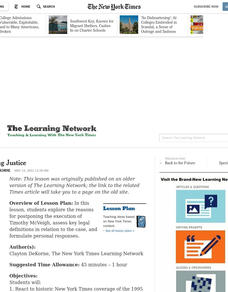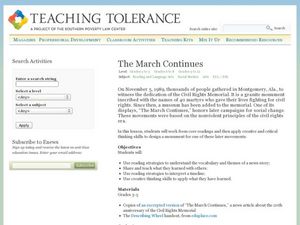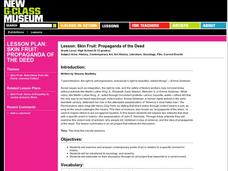Curated OER
Executing Justice
Young scholars explore the reasons for postponing the execution of Timothy McVeigh, assess key legal definitions in relation to the case, and formulate personal responses.
Curated OER
Can Justice Be Taylor-Made?
Students examine and discuss a quotation used as a slogan for Liberia's former president Charles G. Taylor. After reading an article, they consider the allegations against Taylor. In groups, they research a time period of his life and...
Curated OER
Scooting Away from Justice?
Learners examine President Bush's July 2007, decision to commute the 30-month sentence of former White House official, I. Lewis 'Scooter' Libby by reading a New York Times article. They scan editorial sources on various sides of the...
Curated OER
GET UP, STAND UP: Fighting for Rights Around the World
Students explore basic human rights as they explore music by black artists. In this human rights lesson, students examine music as a cultural reflection of the justice issues. Students analyze Jamaican roots reggae of the 70s, American...
Teaching Tolerance
The War on Drugs—Mechanisms and Effects
The war on drugs doesn't have definite results. An interesting lesson examines the social, political, and economic effect of the war on drugs. Academics learn how the war on drugs has led to mass incarcerations and negatively affected...
Adult Fiction by Jewell Parker Rhodes
Ghost Boys: Educator Guide
The spirit of the Civil Rights Movement lives on in a more literal than figurative way in Ghost Boys. A focused lesson plan features Jewell Parker Rhodes' novel about ghosts of slain black teenagers, including the main character, Jerome,...
Curated OER
American Justice: The Texas Cheerleader Plot
Students watch a video about one woman who planned to commit murder because of a cheerleading scandal.
Curated OER
Day in the Life of a Homeless Person
Students examine a day from the point of view of a homeless person. They listen to and discuss two stories, identify ways to help homeless people, watch a Reading Rainbow video, and write an essay.
Curated OER
You and the Law -- Beating the Odds
Students examine the rate of institutional racism in the United States. Individually, they write in their journals about how they can make better choices and increase their self-esteem. Using historical documents, they identify the...
Curated OER
The March Continues
Students explore the Civil Rights Memorial. In this character development and U.S. History lesson, students employ reading comprehension strategies while reading a news article about the Civil Rights Memorial. Students work in groups to...
National Endowment for the Humanities
NAACP's Anti-Lynching Campaign in the 1930s
Students examine the anti-lynching campaign sponsored by the NAACP in the 1930's. In this social justice lesson, students study the history of the anti-lynching campaign and determine why it was not successful. Students conduct research...
Curated OER
Researching Equality and Justice
Choosing from a list, researchers investigate topics that range from the women in the American Civil Rights movement to the quest for equal rights in Iraq and Afghanistan. Although the plan is not detailed, a link to a PBS site that...
Curated OER
Lesson: Skin Fruit: Propaganda of the Deed
Art can express acts of injustice and move society to action. Upper graders analyze contemporary art relating to specific moments in history. They discuss propaganda, anarchy, sociology, and violence as activism. After researching and...
Constitutional Rights Foundation
Plyler v. Doe: Can States Deny Public Benefits to Illegal Immigrants?
Illegal immigration is an ever-changing source of consistent controversy. A reading passage about the rights of undocumented workers and illegal immigrants—and the lack thereof—guides high schoolers into a mock trial activity. Three...
Learning to Live
Attributes of a Civil Society
What makes a society civil? High school freshmen search for examples of justice, kindness, peace, and tolerance in news media and brainstorm how they can promote these attributes in their schools, communities, and world. The well-rounded...
Developing a Global Perspective for Educators
Imagine Being Me
The design of this two-day lesson eloquently exposes learners to the topic of social justice for people with disabilities. The plan is built off the reading of Are You Alone on Purpose? by Nancy Werlin. The activity introduces...
Museum of Tolerance
The Price of Personal Responsibility
A reading of Patrick Henry's "Speech in the Virginia Convention," Henry David Thoreau's "Civil Disobedience," and Rev. Martin Luther King, Jr.'s "Letter from Birmingham Jail" launch a discussion about the price one is willing to pay to...
Ken Taylor
The Stones: Guilty or Not Guilty?
Young drama pupils will perform a number of expressive speaking exercises as they consider the themes of responsibility, consequences, and justice in the very modern Australian play The Stones. With a lot of role playing and...
Curated OER
Bias and Crime in Media
Critical thinking and social justice are central themes for this resource on bias and crime in media. The class views and discusses an incisive PSA that highlights assumptions based on race. Small groups read newspaper opinion pieces...
Museum of Tolerance
The Pursuit of Democracy and Diversity: The Trial of Pro-Social Injustice in Historical Documents and Accounts
Class members investigate The Indian Removal Act of 1830, U.S. Theft of Mexican Territory Timeline, and President Abraham Lincoln’s letter to Horace Greeley, 1862, and then conduct a mock trial of each of these documents to determine...
Stanford University
Letter from Birmingham Jail: The Power of Nonviolent Direct Action
What strategies are most effective in changing an unjust law? Class members examine the tactics used in the Birmingham Campaign of 1963 (Project C) to achieve social justice and social transformation. After examining documents that...
State Bar of Texas
Roe v. Wade
At what point does the right of privacy end and the government begin? Scholars research rights under the Ninth Amendment to the Constitution. Using the 1973 Roe v. Wade Supreme Court case as a starting point, along with small group work...
State Bar of Texas
Grutter v. Bollinger
A university decides not to allow a qualified scholar to enter its institution based on skin and gender—but this case is about a white female? The 2003 Supreme Court case Grutter v. Bollinger lays the foundation for open discussion and...
Facing History and Ourselves
Taking Ownership of the Law
The work of building and maintaining a democracy is, in the words of Justice William Hastie, "never finished." To better understand what Hastie sees as an ongoing building process, class members listen to a seven-minute podcast about two...
Other popular searches
- Criminal Justice System
- Criminal Justice
- Social Justice
- And Social Justice
- Justice Lesson Plan
- Juvenile Justice System
- Environmental Justice
- Justice System
- Juvenile Justice
- The Criminal Justice System
- Supreme Court Justices
- Adult Justice System

























